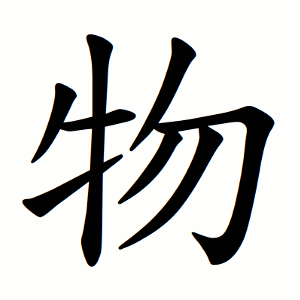物
- thing, object, matter;
- “something, stuff” in general usage;
Etymology
Originally complex and debated:
Composed of 牛 (ox, cow) – semantic element, relating to cattle;
勿 (not / phonetic) – phonetic element, but its ancient form differs.
In oracle bone inscriptions:
Sometimes written as 勿 alone, sometimes with 牛 attached.
Early 勿 (so-called 勿A) had a form resembling a reversed 刀 (knife) with dots, distinct from 勿B (the later “negation 勿”).
Over time, these merged in bronze inscriptions and were fully unified in small seal script.
Interpretations:
If 勿A is seen as a knife, then 物 depicts slaughtering cattle, hence “things, objects.”
If 勿A is seen as a plow, then 物 depicts plowing with oxen, hence “stuff, material.”
Early usage:
Often in compounds like 物牛 (“spotted cattle”) or 物地 / 物土 (“to observe the color of the soil/earth”).
This sense of “observe, examine” survives in modern 물색 (物色, to look for, to observe carefully).
Semantic range:
- concrete things, objects
- “all creation, all beings”
- circumstances, conditions (in extended use)
The semantic development shows a shift from a very concrete image (cattle / plowing / slaughter) to the broad philosophical concept of “all things, everything that exists.”
Usage in Korean
물건 (物件) – object, article
만물 (萬物) – all things, all beings
사물 (事物) – things, affairs
생물 (生物) – living being
물색 (物色) – to look for, to observe
Words that derived from 物
- 건물(建物)–building; structure; edifice
- 고물(古物/故物)–old thing; junk; old man; good-for-nothing
- 광물(鑛物)–mineral
- 광물질(鑛物質)–mineral matter
- 뇌물(賂物)–bribe; kickback
- 동물(動物)–animal
- 동물원(動物園)–zoo
- 동물학(動物學)–zoology
- 동식물(動植物)–flora and fauna
- 만물(萬物)–everything
- 문물(文物)–products of culture
- 물건(物件)–article; thing; item; goods; one; product
- 물리(物理)–physicality; physics
- 물의(物議)–public criticism; public discussion
- 물질(物質)–material; substance; wealth; property; matter
- 물질문명(物質文明)–material civilization
- 미물(微物)–small creature; small and insignificant creature
- 박물관(博物館)–museum
- 사물(事物)–object; thing
- 생물(生物)–organism; living thing; biology; fresh object
- 생물학(生物學)–biology
- 선물(膳物)–gift; present
- 세탁물(洗濯物)–laundry
- 소유물(所有物)–possession; property
- 식물(植物)–plant
- 식물원(植物園)–botanical garden
- 식물학(植物學)–botany; phytology
- 애완동물(愛玩動物)–pet animal
- 유물(遺物)–relic; remains; antiquity; memento; legacy; remnant
- 음란물(淫亂物)–obscene material; pornography
- 인물(人物)–person; man; looks; features; character; talent; man of ability; talented man
- 재물(財物)–wealth
- 제물(祭物)–offering; sacrifice; scapegoat
- 조건물(條件物)–object for the condition
- 조물주(造物主)–the Creator; Creator
- 중심인물(中心人物)–central figure; central character
- 직물(織物)–fabric; cloth
- 폭발물(爆發物)–explosive; bomb
- 표적물(標的物)–target; mark
- 피조만물(被造萬物)–things of creation
- 피조물(被造物)–creation; creature
- 해물(海物)–seafood
- 희생물(犧牲物)–sacrifice
- 竹手心竹竹 (HQPHH)
- ⿰ 牜 勿
